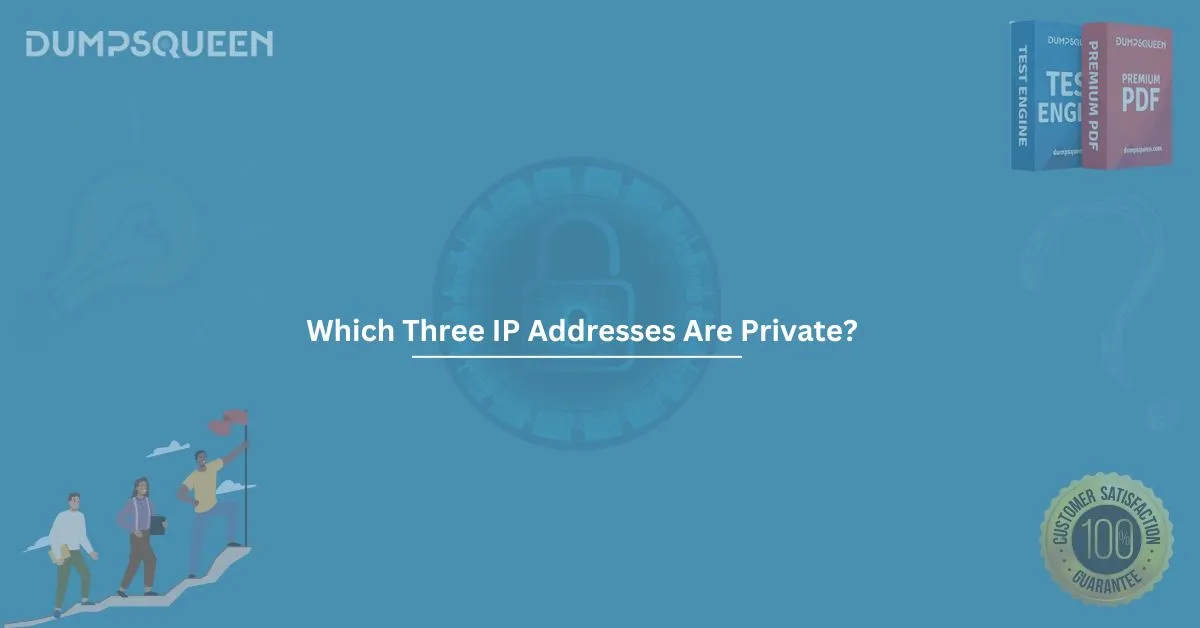Introduction:
In today’s interconnected world, IP addresses play a crucial role in the functioning of the internet. These addresses are assigned to every device that connects to a network, enabling communication across systems. IP addresses can be classified into two main categories: public and private. Understanding private IP addresses is essential for network administrators, cybersecurity experts, and anyone who works with computer networks. In this article, we will explore which three IP addresses are private? (choose three) and discuss the importance of private IP addresses in networking.
What Are IP Addresses?
An IP address (Internet Protocol address) is a unique string of numbers separated by periods (IPv4) or colons (IPv6) that identifies each device on a network. An IP address ensures that data sent over the internet reaches the correct destination device.
There are two types of IP addresses:
- Public IP Addresses: These are assigned by Internet Service Providers (ISPs) and are globally unique. Public IPs allow devices to communicate over the internet.
- Private IP Addresses: These are used within private networks and are not routable over the internet. Private IP addresses are reserved for local communication and help manage internal network traffic.
Why Are Private IP Addresses Important?
Private IP addresses are a critical component of any local area network (LAN). They enable secure communication between devices within the same network while preventing external access. This helps ensure that the devices in a private network, like computers, printers, and other devices, can communicate without interference from external sources.
Some of the key benefits of private IP addresses include:
- Security: Devices using private IP addresses are not directly accessible from the outside world, adding a layer of protection from external threats.
- Network Management: Private IPs help network administrators efficiently manage IP addressing within an organization or home network.
- Conservation of IP Addresses: IPv4 addresses are limited in number. By using private IP addresses, organizations can avoid consuming the public IP address pool unnecessarily.
Which Three IP Addresses Are Private? (Choose Three)
The question "Which three IP addresses are private? (choose three)" refers to specific IP address ranges that are designated as private by the Internet Engineering Task Force (IETF) and are not routable on the public internet. These private IP address ranges are defined by the following standards:
1. IPv4 Private Address Ranges
The following are the private IPv4 address ranges as per RFC 1918:
- 10.0.0.0 – 10.255.255.255 (10.0.0.0/8)
- 172.16.0.0 – 172.31.255.255 (172.16.0.0/12)
- 192.168.0.0 – 192.168.255.255 (192.168.0.0/16)
These three address ranges are used for private networking purposes. Any IP address within these ranges is considered a private address.
2. Why These Ranges?
The ranges specified above are reserved for use in private networks and are not globally unique. This means that these addresses can be used repeatedly in different networks without conflict, as they are not routable on the public internet. This creates a safe environment for devices in a private network to communicate without exposing them to potential cyber threats.
Important Note: While these private IP addresses cannot directly communicate with the public internet, they can do so through a process called Network Address Translation (NAT). NAT allows devices in a private network to share a single public IP address when accessing the internet.
Which Three IP Addresses Are Not Private?
It’s also crucial to distinguish between private and public IP addresses. For example, IPs like 8.8.8.8 (Google's DNS server) or 172.15.0.0 fall outside the private address ranges.
Therefore, the following IP addresses are not private:
- 8.8.8.8: This is a public DNS server address.
- 172.15.0.0: While it falls within the 172.x.x.x range, it is outside the private address space (172.16.0.0 – 172.31.255.255).
- 202.54.1.1: This is a public IP address used by many organizations for internet connectivity.
Common Use Cases for Private IP Addresses
Private IP addresses are often used in scenarios such as:
- Home Networks: In home networks, devices like laptops, smartphones, smart TVs, and printers use private IP addresses to communicate within the network.
- Corporate Networks: Businesses often set up private networks where only internal devices are assigned private IP addresses. These networks may use NAT to allow internet access.
- VPNs: Virtual Private Networks (VPNs) also make use of private IPs to create secure communication channels between remote devices and a corporate network.
Conclusion
Understanding private IP addresses is essential for network management, security, and conservation of the limited pool of public IP addresses. The ranges 10.0.0.0 – 10.255.255.255, 172.16.0.0 – 172.31.255.255, and 192.168.0.0 – 192.168.255.255 are the most commonly used private IP address ranges. These addresses play a vital role in the internal functioning of networks, allowing devices to communicate securely without directly exposing them to the internet.
Sample Multiple-Choice Questions (MCQs)
- Which of the following IP address ranges is a private address range?
- A) 10.0.0.0 – 10.255.255.255
- B) 172.30.0.0 – 172.31.255.255
- C) 192.168.0.0 – 192.168.255.255
- D) 8.8.8.8 – 8.8.8.8
- Answer: A, B, C (All are private address ranges)
- Which IP address is a private address?
- A) 172.25.0.0
- B) 202.54.1.1
- C) 8.8.8.8
- D) 172.15.0.0
- Answer: A (172.25.0.0 is within the private range 172.16.0.0 – 172.31.255.255)
- What is the purpose of private IP addresses in a network?
- A) To facilitate communication over the internet
- B) To reduce the number of public IP addresses needed
- C) To increase network speed
- D) To create a unique address for each device on the internet
- Answer: B (Private IP addresses help conserve public IP addresses)
- Which of the following statements is true about private IP addresses?
- A) Private IP addresses can be accessed directly over the internet
- B) Private IP addresses are assigned by ISPs
- C) Private IP addresses are not routable on the public internet
- D) Private IP addresses are used for global communication
- Answer: C (Private IP addresses are not routable on the public internet)




